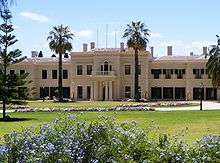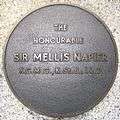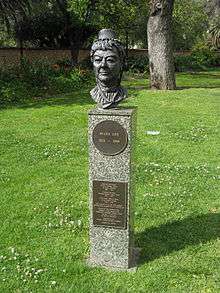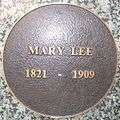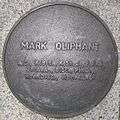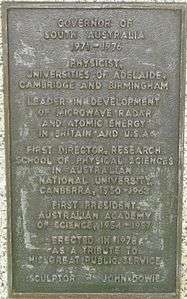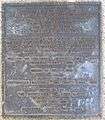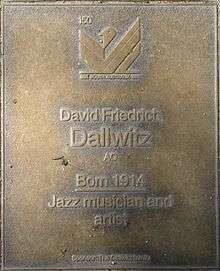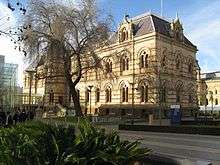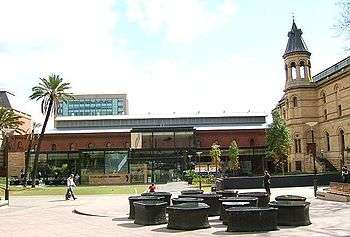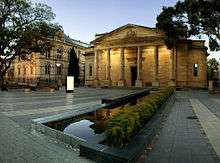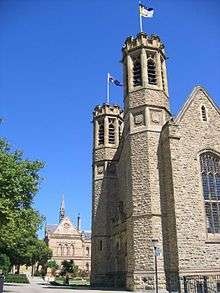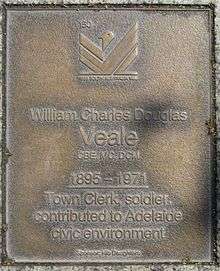Jubilee 150 Walkway



The Jubilee 150 Walkway, also variously known as the Jubilee 150 Commemorative Walk, the Jubilee 150 Walk, and the Jubilee Walk, is a series of (initially) 150 bronze plaques set into the pavement of North Terrace, Adelaide. It was officially opened on 21 December 1986.[1] It was commissioned as part of the celebrations commemorating the 150th anniversary of the founding of the state of South Australia.[2] The plaques contain the names and deeds of (initially) 170 people who made major contributions to the founding and development of South Australia. Since 1986, the Adelaide City Council has added four plaques.[3]
The plaques are arranged in alphabetic order,[4] and stretch from King William Street to Pulteney Street along the north side of North Terrace. The walkway starts at the South African War Memorial, and passes in front of Government House, the National War Memorial, the State Library, the Museum, the Art Gallery and the University of Adelaide.
King William Street
The walkway starts near the corner of North Terrace and King William Street, in front of the front gates and gatehouse of Government House. The very corner is occupied by the South African War Memorial. Also on that corner, starting from the gatehouse and walking SE, are statues of the heads of Sir Thomas John Mellis Napier (1882–1976),[5] Mary Lee[6] and Sir Mark Oliphant,[7] all of whom have plaques on the walkway.
South African War Memorial
South African Boer War Memorial by A Jones 1904[8]
-

Circa. 1926
-
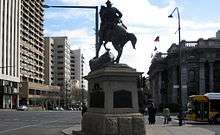
Circa. 2008
-
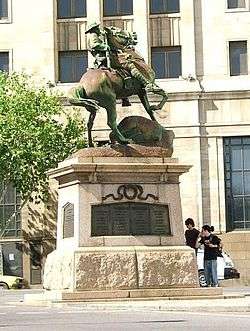
-
-
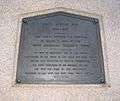
-

-
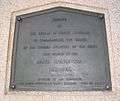
-

Government House
Running along the fence of Government House, there is an "Avenue of Gas Lamps"
Statues
Also on the corner of North Terrace and King William Street near the start of the Walkway are statues of the heads of three prominent South Australians. This section of North Terrace is named the Price Henry Gardens.[9]
Sir Thomas John Mellis Napier[5] by J Dowie 1970[8]
Unveiled by His Excellency the Governor-General of Australia, The Right Honourable Sir Paul Hasluck, C.M.G., G.C.V.O., K.St.J, 2 July 1970.[5]
Sir Mark Oliphant[7] by John Dowie 1978[10]
Start of the Walkway
Plaques: Angas – Barr Smith
-

First plaque
-
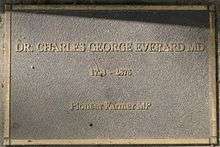
Charles George Everard (1794–1876)
-

Sir Henry Ayers
-

Sir Richard Baker
- ^ George Fife Angas (1789–1879) – 'Angas, George Fife (1789–1879)', Australian Dictionary of Biography, Volume 1, MUP, 1966, pp 15–18.
- ^ George French Angas (1822–1886) – E. J. R. Morgan, 'Angas, George French (1822–1886)', Australian Dictionary of Biography, Volume 1, Melbourne University Press, 1966, pp 18–19.
- ^ E. Zalums, 'Bagshaw, John Stokes (1808–1888)', Australian Dictionary of Biography, Volume 3, Melbourne University Press, 1969, pp 72–73.
Statue of Dame Roma Mitchell
The Honourable Dame Roma Mitchell, modelled by Janette Moore, Sculpted by John Woffinden and Sally Francis, unveiled 1 July 1999[10]
-

Looking west from the statue of Dame Roma Mitchell back towards King William Street
-

Statue of Dame Roma Mitchell by Janette Moore
-

-

Plaques: Begg – Brewster Jones
-

Percy Raymond Begg
-

Sir Donald Bradman
- ^ Valmai A. Hankel, 'Bejah, Dervish (1862?–1957)', Australian Dictionary of Biography, Volume 7, Melbourne University Press, 1979, p. 250.
Statue: Venere Di Canova
Venus di Canova donated by W A Horn in 1892. Somewhat controversial at the time of its unveiling in 1892, this piece was the first of Adelaide's street statues.[10] It is a copy in Carrara marble of the statue of Venus by Antonio Canova – the original is at the Pitti Palace in Florence. (Photo of the original.) – Pedestal of Sicilian and Kapunda marble. Executed by Fraser & Draysey. Presented by Mr W A Horn. Unveiled 3 September 1892, by His Worship the Mayor (F.W. Bullock, Esq.).[11]
-

Looking west
-

Statue
-

Base
Plaques: Brookman – Cocks
-

Sir Hugh Cairns
-

Sir John Cleland
- ^ George Brookman, KBE(C), 19 October 1920, ItsAnHonour.gov.au Services during the War.
- ^ R. M. Gibbs, 'Brookman, Sir George (1850–1927)', Australian Dictionary of Biography, Volume 7, Melbourne University Press, 1979, pp 429–430.
- ^ Leith G. MacGillivray, 'Butler, Henry John (1889–1924)', Australian Dictionary of Biography, Volume 7, Melbourne University Press, 1979, pp 504–505.
- ^ Suzanne Edgar, Joyce Gibberd, 'Cawthorne, Charles Wittowitto (1854–1925)', Australian Dictionary of Biography, Volume 7, Melbourne University Press, 1979, pp 594–595.
- ^ R. J. Bridgland, 'Chapman, Sir Robert William (1866–1942)', Australian Dictionary of Biography, Volume 7, Melbourne University Press, 1979, pp 613–615.
- ^ Marie Mune, 'Cocks, Fanny Kate Boadicea (1875–1954)', Australian Dictionary of Biography, Volume 8, Melbourne University Press, 1981, pp 46–47.
Statue of Lord Florey[12]
Lord Florey by J Dowie 1969[10] Unveiled by the Right Honourable the Lord Mayor (Robert E Porter, Esq.), 25 June 1969.[13]
Plaques: Crocker – Dickinson
-

Sir Walter Crocker
-

Sir Samuel Davenport
-

Sir Samuel Benson Dickinson (1912–2000)[3]
- ^ Suzanne Edgar, 'Davey, Constance Muriel (1882–1963)', Australian Dictionary of Biography, Volume 8, Melbourne University Press, 1981, pp 216–217.
- ^ Helen Jones, 'de Lissa, Lillian Daphne (1885–1967)', Australian Dictionary of Biography, Volume 8, Melbourne University Press, 1981, pp 273–274.
- ^ These plaques are additional to the original 150.
Statue of Matthew Flinders
Captain Matthew Flinders by F. Brook Hitch, A.R.B.S.[14] Pedestal of Murray Bridge red granite from Kirchel's quarry at Swanport. Paving of Tea Tree Gully freestone. Architect, A.E. Simpson, I.S.O., F.R.A.I.A. (Architect-in-Chief of subscription.) Unveiled 12 April 1934.[15]
Plaques: Duguid – Gerrard
-

Sir Lloyd Dumas[1]
-

Sir Thomas Elder[4]
-

Looking west
- ^ S. Cockburn, 'Dumas, Sir Frederick Lloyd (1891–1973)', Australian Dictionary of Biography, Volume 14, Melbourne University Press, 1996, pp 44–46.
- ^ Cite error: The named reference
newwas invoked but never defined (see the help page). - ^ M. French, 'Dunn, John (1802–1894)', Australian Dictionary of Biography, Volume 4, Melbourne University Press, 1972, pp 116–117.
- ^ Sir Thomas Elder
- ^ E. M. Fisher, 'Elphick, Gladys (1904–1988)', Australian Dictionary of Biography, Volume 17, Melbourne University Press, pp 360–361.
- ^ Brian Dickey, 'Farr, Julia Warren (1824–1914)', Australian Dictionary of Biography, Supplementary Volume, Melbourne University Press, 2005, p. 124.
- ^ J. S. Dunkerley, 'Farr, George Henry (1819–1904)', Australian Dictionary of Biography, Volume 4, Melbourne University Press, 1972, pp 155–156.
- ^ A. F. Scammell, 'Faulding, Francis Hardey (1816–1868)', Australian Dictionary of Biography, Volume 4, Melbourne University Press, 1972, pp 159–160.
- ^ Lord Florey
- ^ 'Fowler, David (1826–1881)', Australian Dictionary of Biography, Volume 4, Melbourne University Press, 1972, pp 207–208.
- ^ Alan Warden, 'Gerard, Alfred Edward (1877–1950)', Australian Dictionary of Biography, Volume 8, Melbourne University Press, 1981, pp 642–643.
National War Memorial
National War Memorial – Great War – 1914–1918 by Woods, Bagot, Jory & Laybourne Smith; and Rayner Hoff, 1931.[14]
-

-

-
Spirit of Duty
-
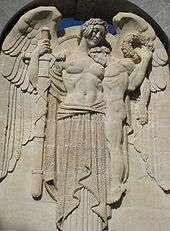
Spirit of Compassion
Although the National War Memorial was initially proposed as a memorial to those who served in "The Great War", the site has since grown to incorporate a number of smaller memorials. These include a memorial to the Battle of Lone Pine; the "French Memorial", which commemorates those who fought and died in France during the first and second World Wars; an honour roll of those who died in World War II; and the "Australian Armed Forces Memorial", encompassing the Malayan Emergency of 1948–1960, the Korean War, the Indonesia-Malaysia confrontation in Borneo, and the Vietnam War. In addition, the wall which surrounds the northern and western sides of the site features the six "Crosses of Memory" – a series of "simple wooden crosses" commemorating the Siege of Tobruk from 1941 and the 10th, 27th, 48th and 50th battalions of 1916.
- European Memorials
- 8 Division A.I.F
- Lone Pine
- South-east Asia and Korea
- World War II honour rolls
Plaques: Gibb – Gill
-

Sir Claude Gibb[1]
-

Vietnam War VC recipient:
Major Peter Badcoe
- ^ Gwenyth C. Moxham, 'Gibb, Sir Claude (1898–1959)', Australian Dictionary of Biography, Volume 14, Melbourne University Press, 1996, p. 264.
- ^ Philippa L. Fletcher, 'Gibson, Gladys Ruth (1901–1972)', Australian Dictionary of Biography, Volume 14, Melbourne University Press, 1996, pp 268–269.
Kintore Avenue
The Institute building
Plaques: Gosse – Hall
- ^ Merrilyn Lincoln, 'Graham, Margaret (1860–1942)', Australian Dictionary of Biography, Volume 9, Melbourne University Press, 1983, pp 68–69.
- ^ Cite error: The named reference
newwas invoked but never defined (see the help page). - ^ R. L. Heathcote, 'Price, Sir Archibald Grenfell (1892–1977)', Australian Dictionary of Biography, Volume 16, Melbourne University Press, 2002, pp 31–33.
Statue of Edward VII
Huge bronze statue of Edward VII by Sir Bertram Mackennal, K.C.V.O., R.A.
Pedestal designed by sculptor. Paid for by public subscription. Unveiled 15 July 1920.[14][16]
-

Back of statue to right
Plaques: Hancock – Hartley
-

Looking east from Edward VII
- ^ Oswald Pryor, 'Hancock, Henry Richard (1836–1919)', Australian Dictionary of Biography, Volume 4, Melbourne University Press, 1972, pp 333–334.
- ^ Kay Hannaford, 'Hannaford, Alfred (1890–1969)', Australian Dictionary of Biography, Volume 14, Melbourne University Press, 1996, pp 373–374.
- ^ Robert F. G. Swinbourne, 'Hannaford, George (1852–1927)', Australian Dictionary of Biography, Volume 9, Melbourne University Press, 1983, pp 186–187.
State Library of South Australia
-

-

-

Robert Burns by WJ Maxwell 1894[1][2] Presented by the Caledonian Society. Unveiled 5 May 1894,
-

- ^ Refer http://www.cityofadelaide.com.au/adccbrandwr/_assets/main/lib60091/walktrailhistorical.pdf page 7.
- ^ Robert Burns by WJ Maxwell 1894 – This statue bears the honour of being the first statue carved in Adelaide.
Plaques: Hassell – Hill-Ling
-

Sir Edward Hayward
-

Sir Robert Helpmann
-

Sir Hans Heysen
Mortlock Library
Plaques: Holden – Jolly
-

Sir Edward Holden
-

Sir Walter Hughes[1]
-

Sir Roland Jacobs
- ^ Sir Walter Hughes
Museum of Natural History
Plaques: Kavel – Mitchell
-

Pastor August Kavel
-

Sir Sidney Kidman
-

Sir George Kingston
-

Colonel William Light
-

Dame Ruby Litchfield
-

Sir John Melrose[7]
-

Dame Roma Mitchell
- ^ Suzanne Edgar, 'McPherson, John Abel (1860–1897)', Australian Dictionary of Biography, Volume 10, Melbourne University Press, 1986, pp 357–358.
- ^ J. B. Hirst, 'Martin, James (1821–1899)', Australian Dictionary of Biography, Volume 5, Melbourne University Press, 1974, pp 219–220.
- ^ Sir Douglas Mawson
- ^ J. B. Hirst, 'May, Frederick (1840–1897)', Australian Dictionary of Biography, Volume 5, Melbourne University Press, 1974, pp 231–232.
- ^ Helen Bourke, 'Mayo, George Elton (1880–1949)', Australian Dictionary of Biography, Volume 10, Melbourne University Press, 1986, pp 465–466.
- ^ Neville Hicks, Elisabeth Leopold, 'Mayo, Helen Mary (1878–1967)', Australian Dictionary of Biography, Volume 10, Melbourne University Press, 1986, pp 466–467.
- ^ Suzanne Edgar, 'Melrose, Sir John (1860–1938)', Australian Dictionary of Biography, Volume 10, Melbourne University Press, 1986, pp 482–483.
- ^ Suzanne Edgar, Helen Jones, 'Miethke, Adelaide Laetitia (1881–1962)', Australian Dictionary of Biography, Volume 10, Melbourne University Press, 1986, pp 497–498.
Art Gallery of South Australia
Plaques: Mitchell – Oliphant
-

Sir William Mitchell
-

Sir Mellis Napier[1]
-
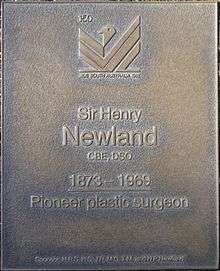
Sir Henry Newland
-
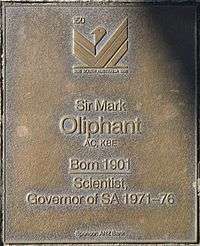
Sir Mark Oliphant[2]
- ^ Cite error: The named reference
Napierwas invoked but never defined (see the help page). - ^ Cite error: The named reference
Oliphantwas invoked but never defined (see the help page).
University of Adelaide
Mitchell Building
-
-
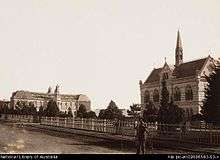
1869
-

East face
-
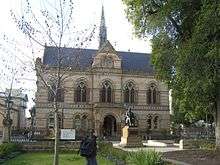
Winter 2008
Plaques: Playford – Short
- Playford – Price
-

Sir Thomas Playford
- Statue of Sir Walter Watson Hughes (1803–1887)[17]
- Ramsay – Short
- Statue of Sir Samuel Way
- The Right Hon. Sir S.J. Way, Bart., P.C, D.C.L., LL.D. by Alfred Drury, R.A., A.R.C.A. 1924
- Designed by Walter Bagot, F.R.I.B.A., F.R.A.I.A. Erected by J. Tillett.
- Pedestal of granite. Paid for by public subscription. Unveiled 17 November 1924.[18]
Elder Conservatorium of Music
Plaques: Simpson – Stow
-

Sir Edwin Smith
Statues of Sir Douglas Mawson[19][20] and Sir Thomas Elder,[21] on Goodman Crescent in front of the Elder Conservatorium
-

Sir Douglas Mawson
Unveiled by the Lord Mayor, Dr John Watson, on 16 August 1982. -

Sir Thomas Elder
-

-

Sir William Goodman Crescent
-

South face of the base of the statue of Sir Thomas Elder
-

East face
-

North face
-

West face
-

Sir Edward Stirling
- ^ Cite error: The named reference
Leewas invoked but never defined (see the help page). - ^ No, I don't know why Mary Lee's plaque is here between Stow & Strange.
Bonython Hall
Plaques: Strange – Todd
-

Sir Charles Todd
Napier[5] Building
Plaques: Tolmer – Wright
-

Pioneer Vignerons:
Johann Gramp,
Richard Hamilton,
Joseph Seppelt,
Samuel Smith -

Pioneer Vignerons:
Thomas Hardy,
Christopher Penfold,
Mary Penfold,
John Reynell -

Sir Samuel Way
-

Sir Kenneth Wills
- ^ No, I don't know why Torrens & Traeger are out of sort order.
- ^ Joachim Matthias Wendt, www.southaustralianhistory.com.au
- ^ Cite error: The named reference
newwas invoked but never defined (see the help page).
Ligertwood Building
Last Plaque
-

Final plaque
-

Napier and Ligertwood buildings, with last plaque
- End of Walkway
References and notes
- ↑ Jubilee 150 Commemorative Walk, Corporation of the City of Adelaide. Retrieved 27 June 2016.
- ↑ South Australia was founded on 28 December 1836.
- ↑ The Walkway now comprises 154 plaques containing the names and deeds of 174 people, plus the first and last plaques.
- ↑ The exceptions to strict alphabetic order are:
- The 13 South Australians awarded the V.C. and the G.C. in the two World Wars and the Vietnam War appear in front of the War Memorial;
- Mary Lee's plaque appears between the plaques for Stow and Strange;
- Torrens and Traeger are interchanged;
- The eight pioneer vignerons are grouped on two plaques between Veale and Waite.
- 1 2 3 4 Sir Thomas John Mellis Napier
- P. A. Howell, 'Napier, Sir Thomas John Mellis (1882–1976)', Australian Dictionary of Biography, Volume 15, Melbourne University Press, 2000, pp 461–463.
- The Honourable Sir Mellis Napier (K.C.M.G., K.St.J., LL.D.), Statues of the City of Adelaide, Adelaide City Council.
- 1 2 Mary Lee (1821–1909)
- Helen Jones, 'Lee, Mary (1821–1909)', Australian Dictionary of Biography, Volume 10, Melbourne University Press, 1986, pp 50–52.
- 1 2 Sir Mark Oliphant (1901–2000)
- Sir Mark Oliphant, A.C., K.B.E., K.St.J., F.R.S., F.A.A., B.Sc., Ph.D., Hon. D.Sc., Hon LL.D., Statues of the City of Adelaide, Adelaide City Council.
- 1 2 Refer http://www.cityofadelaide.com.au/adccbrandwr/_assets/main/lib60091/walktrailhistorical.pdf page 9.
- ↑ Statues of the City of Adelaide, Adelaide City Council.
- 1 2 3 4 Refer http://www.cityofadelaide.com.au/adccbrandwr/_assets/main/lib60091/walktrailhistorical.pdf page 8.
- ↑ Venus, Statues of the City of Adelaide, Adelaide City Council.
- ↑
- ↑ Lord Florey, Statues in the City of Adelaide, Adelaide City Council.
- 1 2 3
- ↑ Captain Matthew Flinders, R.N., Statues in the City of Adelaide, Adelaide City Council.
- ↑ His Majesty King Edward VII, Statues in the City of Adelaide, Adelaide City Council.
- ↑
- ↑ Sir Samuel Way, Statues in the City of Adelaide, Adelaide City Council.
- ↑
- ↑ Professor Sir Douglas Mawson, Statues in the City of Adelaide, Adelaide City Council.
- ↑
- Emily Potter, "How can you live in a city of monuments?": Reading Commemoration and Forgetting in Adelaide's North Terrace Precinct, Altitude vol 2, 2002.
- "S.A.'s greats : the men and women of the North Terrace plaques", edited by John Healey, Historical Society of South Australia, 2001. nla, UofA, UofA catalogue, Historical Society of SA. Reprinted 2002. Reprinted 2003. ISBN 0 9579430 0 8 (Note that James Park Woods VC is missing from this book.)
- "South Australian biographies, 1980", Blue Book of South Australia : Biographies Australia, 1980. nla
- "Biographical index of South Australians 1836–1885", editor: Jill Statton, South Australian Genealogy and Heraldry Society, 1986. nla
- Stewart Cockburn, "Notable lives : profiles of 21 South Australians", Ferguson Publications, 1997. nla
- Stewart Cockburn, "The patriarchs", Ferguson Publications, 1983. nla Back cover sub-title: The lives and philosophies of 30 distinguished South Australians.
- "Late picking : vintage Jubilee 150", edited by Stella Guthrie, South Australian Council on the Ageing, 1986. nla
34°55′16″S 138°36′16″E / 34.921200°S 138.604328°E
]

